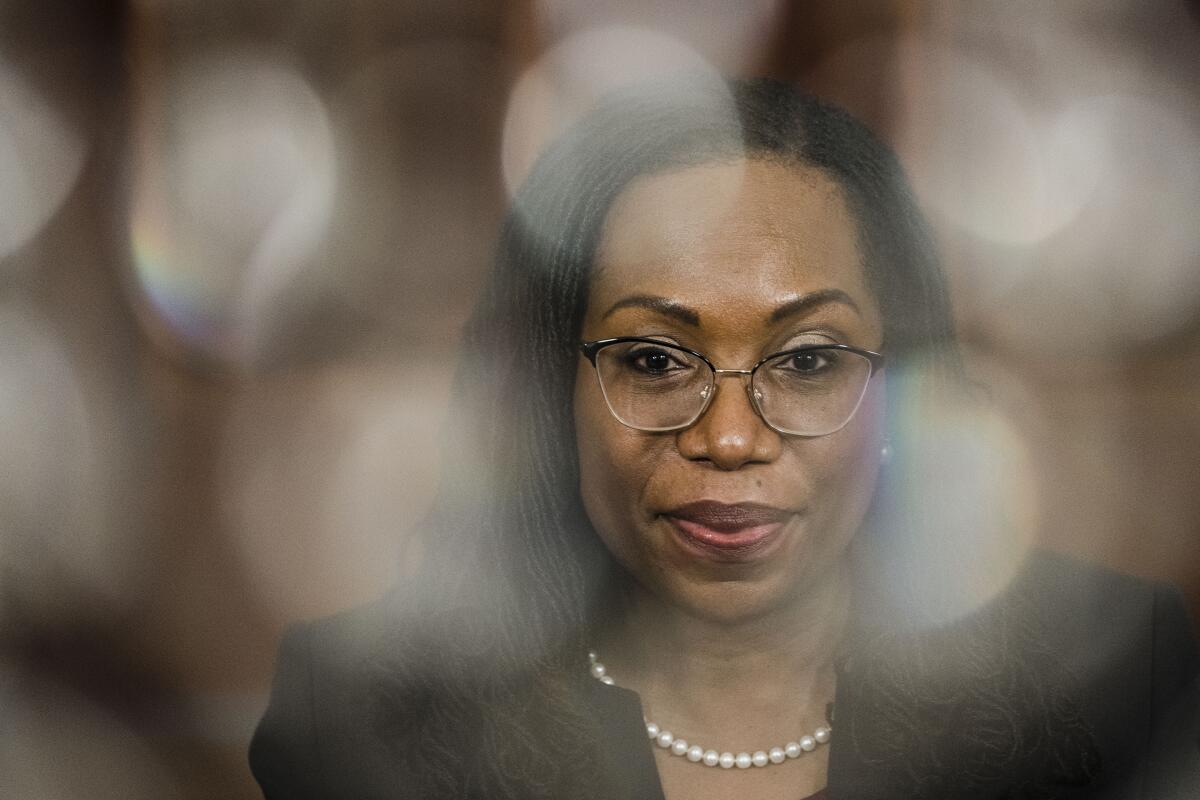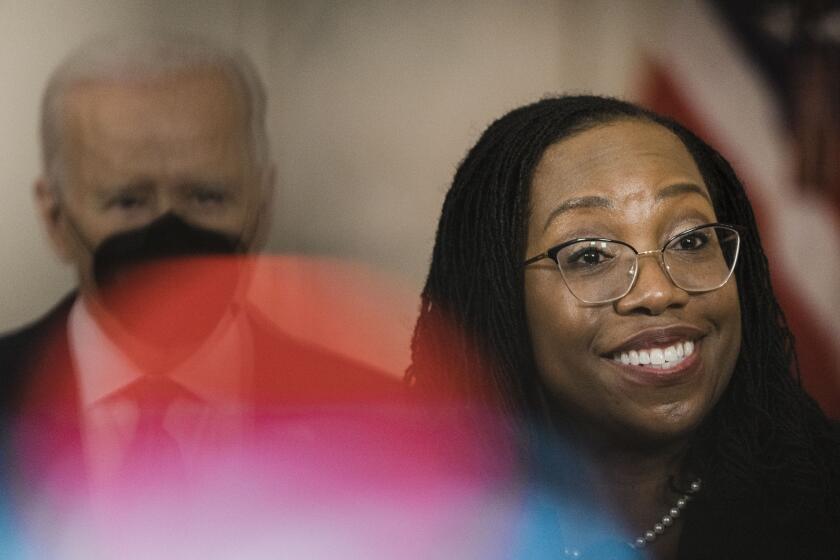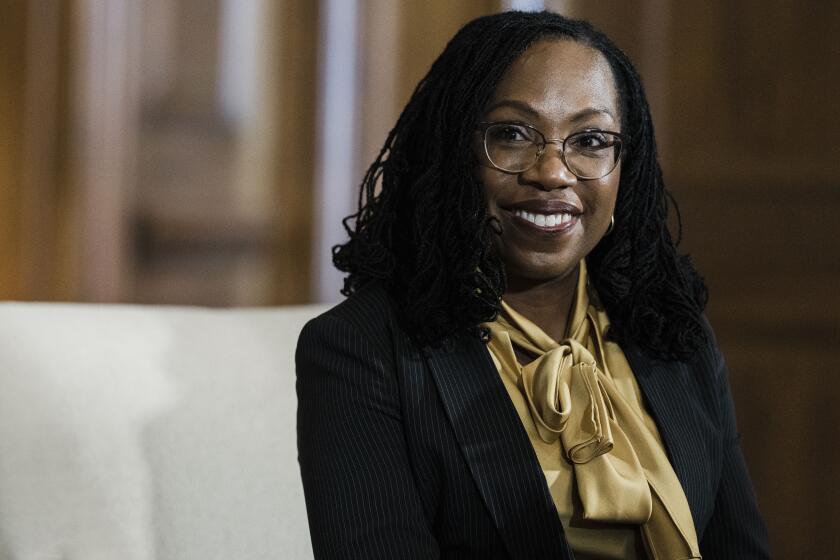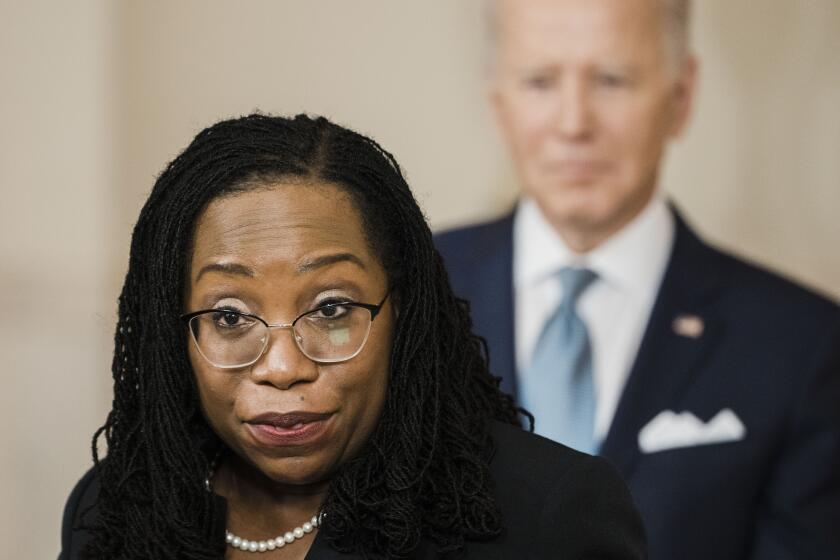Another thing that makes Ketanji Brown Jackson’s nomination special

- Share via
Over the years, many former prosecutors have become justices of the U.S. Supreme Court. Earl Warren, for instance, served as Alameda County’s district attorney and California’s attorney general. Sonia Sotomayor worked at the Manhattan district attorney’s office. Samuel A. Alito Jr. worked for the U.S. attorney in New Jersey.
But if she is confirmed, Ketanji Brown Jackson would be the only justice in the Supreme Court’s modern history to have served as a public defender.
That may not sound like a big deal compared to her other claim to fame: being the first Black woman nominated to the court.
But it matters. Unlike her potential colleagues Alito and Sotomayor, Jackson’s job was not to prosecute accused criminals and send them to prison; it was to defend them, at government expense, when they could not afford lawyers themselves. That’s an entirely different experience.
Opinion Columnist
Nicholas Goldberg
Nicholas Goldberg served 11 years as editor of the editorial page and is a former editor of the Op-Ed page and Sunday Opinion section.
In a normal country in normal times, the U.S. senators considering her nomination would see that on her resume, thank her for her public service, praise her dedication to the poor and to the law, and note the value of diversity of experience on the federal bench. But instead, Republicans on the Senate Judiciary Committee are more likely to treat her few years in the public defender’s office in Washington as a mark against her and to hint unfairly that if she defended criminals for a living, she must, by necessity, approve of their crimes.
Why do I think they’ll do that? Because that’s what they did last year when she was nominated to be a federal appeals court judge.
During the confirmation process last April, Jackson was asked a series of skeptical questions by Sens. Ben Sasse (R-Neb.), Thom Tillis (R-N.C.), Tom Cotton (R-Ark.) and others. Why exactly had she chosen to become a federal public defender? Was she not concerned that her work would result in more violent criminals being put back on the streets? Was it true she had represented terrorists at Guantanamo Bay? Did she consider resigning from her position rather than do so?
Oh, the sanctimony! All Jackson had done was represent her clients as required by her government job, which, for the record, she held for only a couple of years ending 15 years ago. Yet the Republicans couldn’t shut up on the subject.
Ketanji Brown Jackson is an unequivocally well-qualified nominee for the Supreme Court. But if she is confirmed, the court’s conservative hammerlock will not change.
Jackson responded straightforwardly. She said she had become a public defender to help people in need and to promote the “core constitutional value” that government may not throw people in prison without first proving the criminal charges against them.
“Every person who is accused of criminal conduct by the government, regardless of wealth and despite the nature of the accusations, is entitled to the assistance of counsel,” she said.
The belief that defense lawyers should be judged by the clients they represent is not uncommon, but it is dangerous and wrongheaded, especially when applied to a public defender.
Sure, public defenders represent accused murderers, drug dealers, terrorists and others the rest of us would like nothing to do with.
But that’s their job. That’s the promise of the U.S. Constitution. The American legal system depends for its legitimacy on the principle that criminal defendants, who are deemed innocent until proven otherwise, will receive a fair, robust defense.
The four-day hearings for Judge Ketanji Brown Jackson will begin March 21, a top Senate Democrat announced.
Without lawyers representing the accused, trials wouldn’t be trials at all but open-and-shut tribunals in which a mere accusation would be equivalent to conviction. That a young lawyer like Jackson would step forward to defend unpopular clients at a federal public defender’s office rather than rush into lucrative private practice is to her credit.
We need more such people on the bench, at all levels. They’re “urgently needed,” as Sen. Cory Booker (D-N.J.) put it. “I think it is noble work,” he added.
At the moment there are three former prosecutors on the nine-member Supreme Court. By contrast, the last justice who had any background in criminal defense at all was Thurgood Marshall, who was appointed to the court more than 50 years ago.
According to the Alliance for Justice, before Joe Biden took office, only three of the 166 judges sitting on the federal courts of appeals had spent the majority of their careers as lawyers working as state or federal public defenders.
Of course, not all former prosecutors are tough-on-crime conservatives, and not all defense lawyers or public defenders are liberal softies. But a judge’s life experience is relevant to how he or she views the world and thinks about the law.
Some top Republicans quickly moved to define Judge Ketanji Brown Jackson, President Biden’s nominee for Supreme Court justice, as a favorite of the far left.
The Supreme Court and other federal courts hear cases regularly about the constitutional rights of criminal defendants and the role and powers of prosecutors. They consider such things as the prosecution’s obligation to turn over exculpatory evidence to the defense, what constitutes an unreasonable search, whether a lawyer provided adequate counsel and what is the modern-day meaning of “cruel and unusual punishment” or “due process of law.”
“There is a direct line from my defender experience to what I do on the bench, and I think it’s beneficial,” Jackson said in 2021. She didn’t say (and I doubt it’s the case) that it made her a bleeding-heart pushover for defendants. But she said the experience taught her, when she subsequently became a trial court judge, to speak directly to defendants, use their names and explain to them what was going on, the sentence she was imposing and why.
It sounds like working with defendants humanized them for her.
The Biden administration, to its credit, has been consciously seeking judicial nominees whose legal experience has been, as White House Counsel Dana Remus put it, “historically underrepresented on the federal bench, including those who are public defenders, civil rights and legal aid attorneys.”
If the Republicans could stop that, I have no doubt they would. Let’s hope they can’t.
More to Read
A cure for the common opinion
Get thought-provoking perspectives with our weekly newsletter.
You may occasionally receive promotional content from the Los Angeles Times.














